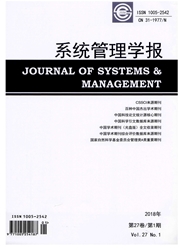

 中文摘要:
中文摘要:
在加工时间可控的单机排序中,面对随机发生的干扰事件,研究了初始加工时间表的制定问题。对于干扰事件造成的影响采用匹配时间排序的应对策略,在干扰事件发生后,通过压缩工件加工时间,使新时间表在某时间点后完全恢复到初始加工时间表。基于工件吸收干扰事件影响的能力,设计复合排序规则来决定工件的优先级。由于问题内在的复杂性,在复合排序规则中,应用遗传算法来确定某给定待处理工件集的最优参数。使用概率分布表示干扰事件的发生时刻和持续时间,并综合概率信息和工件的优先级来制定初始加工时间表。最后,通过随机数值试验模拟,发现本文设计的初始时间表优于根据最短加工时间优先规则制定的初始时间表,验证了方法对于处理干扰事件影响的有效性。
 英文摘要:
英文摘要:
Facing random disruptions in single machine scheduling problem with controllable processing times, we study how to generate an initial schedule. The match-up scheduling policy is adopted to deal with the impact of disruptive events. During execution period after disruptions occurs, by compressing some jobs' processing times, we revise the initial schedule and make it consistent with the initial schedule at match-up time points. Based on job's capability to absorb disruptions, we design a composite dispatching rule to determine each job's priority. Due to inherent complexities, a heuristic is used to decide the optimal parameters for given job set in composite rule. We determine initial schedule based on jobs' priority and the probabilistic information of disruptions. Through randomly generated numerical experiments, we show that the proposed approach outperforms the SPT schedule, and it can be an effective tool against disruptions.
 同期刊论文项目
同期刊论文项目
 同项目期刊论文
同项目期刊论文
 An Improved Ant Colony Optimization and Its Application to Vehicle Routing Problem with Time Windows
An Improved Ant Colony Optimization and Its Application to Vehicle Routing Problem with Time Windows 期刊信息
期刊信息
